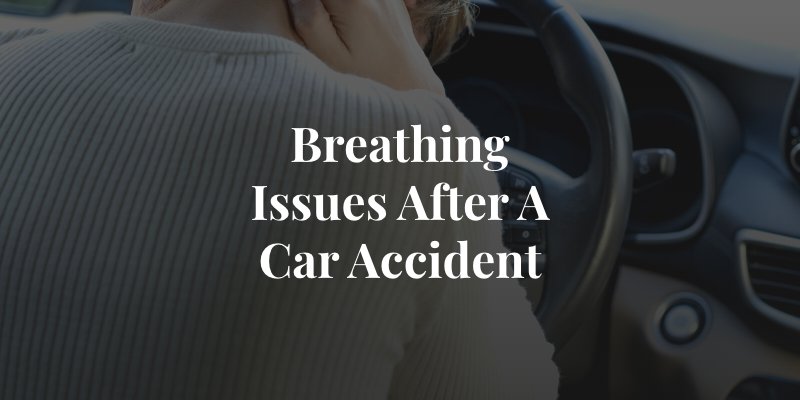The trauma of being involved in a car accident can result in various physical and emotional injuries, several of which could affect your breathing. If you are having trouble breathing normally in the aftermath of a car accident, it is critical to get medical care right away. You could have a severe injury that requires immediate treatment, or it may be a psychological side effect.

If your symptoms began after a collision in Southern California, an experienced Orange County car accident attorney can also help you understand your legal options while you focus on getting the care you need.
Initial Shock
The sudden and intense shock of getting into a car accident can result in immediate breathing problems, including shallow breathing or hyperventilation. In a physical state of shock, the body’s vital functions may be disrupted. This can make it difficult to breathe normally or deeply.
Chest Trauma
Physical injuries from a car accident, especially to the chest or abdomen, can result in breathing problems as a symptom. Blunt-force trauma to the chest from impact with the steering column or a seat belt, for example, could cause bruising, swelling or fractured ribs. These injuries can make it painful to breathe deeply or cause tightness in the chest.
Broken Ribs
One or more broken ribs are a relatively common type of car accident injury, especially in serious collisions where the victim is thrown against the interior of the car. The force of an impact against the ribs can cause them to crack or break. This type of injury can cause soreness and pain, especially when breathing deeply. This can affect the victim’s ability to take a full breath, leading to feelings of breathlessness or dizziness.
Lung Injuries
The lungs themselves can suffer harm in a car accident. One hidden danger is pneumothorax, or a collapsed lung. This type of injury can occur if a broken rib punctures a lung, causing air to enter the space between the lung and the chest wall. As air pressure builds in the chest cavity, the lung can be prevented from fully expanding, causing breathing problems. If left untreated, the pressure may continue to build until the lung collapses completely. This is a life-threatening medical emergency that requires immediate attention.
Airbag Injuries
When an airbag deploys in an automobile accident, it releases chemicals and propellants into the cab of the car. Inhaling these substances can cause coughing, wheezing and shortness of breath, especially for individuals with pre-existing respiratory problems. Chemical irritation can lead to inflammation of the lungs and airways, making it harder to breathe.
Internal Injuries
Damage to any of the organs or internal bleeding from a car accident could affect the victim’s breathing. Injuries to the heart or major blood vessels, for instance, can cause a rapid heartbeat, shallow breathing, and feelings of faintness or weakness.
Post-Traumatic Stress Disorder
In the days and even weeks following a car accident, a victim may experience symptoms of post-traumatic stress disorder (PTSD). This can include chronic anxiety, panic attacks and hyperventilation that impact breathing. This mental health condition can create breathing problems even without physical injuries.
Breathing Problems and Your Car Accident Claim
You should always go to a hospital if you are experiencing breathing problems after a car accident. If you are diagnosed with any type of injury or mental health condition from the collision that is causing trouble breathing, you may be entitled to financial compensation for your related medical expenses, ongoing care, lost wages, and pain and suffering. An experienced personal injury lawyer can help you seek fair financial compensation for difficulty breathing in addition to your other losses.
